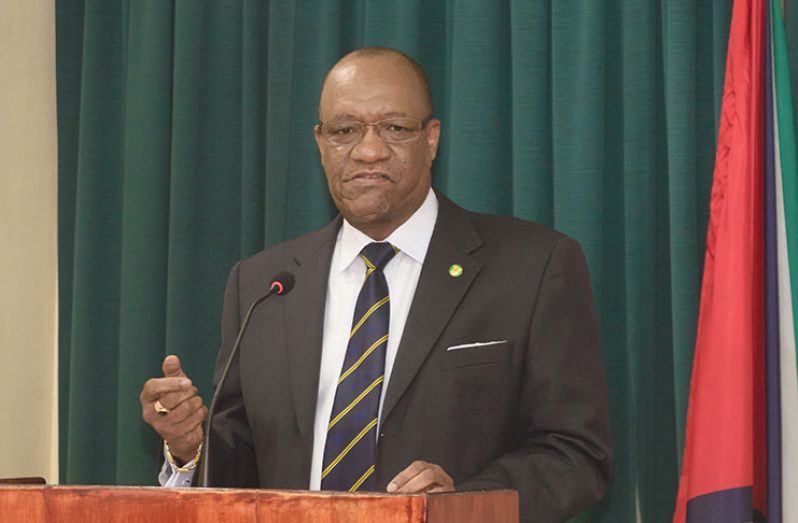Minister of State Joseph Harmon has called on critics of the Cybercrime Bill to not isolate specific sections of the legislation which are aimed at strengthening the State against cyber attacks.
Speaking at his weekly post-Cabinet press briefing held at the Ministry of the Presidency (MoTP), Harmon made it clear that cyber defence is a major concern not only for Guyana, but globally.
Persons have expressed outrage about Section 18 of the bill which speaks to offences of sedition.
Section 18 (1) states that a person commits an offence of sedition if the person, whether in or out of Guyana, intentionally publishes, transmits or circulates by use of a computer system, a statement or words, whether spoken or written, a text, video, image, sign, visible representation, or other thing, that: “brings or attempts to bring into hatred or contempt, or excites or attempts to excite disaffection towards the government established by law in Guyana.”
However, Harmon was quick to point out that government is seeking to guard against espionage, sabotage and subversion. He said government is concerned about the state’s security systems and will do everything to protect same.
“You’d recognise that there is so much there that is about national security. A cyber attack is one of these silent means, a kind of attack [where] you don’t have an enemy in uniform with guns and so on, but these are people who utilise the Internet, computers to actually attack your systems,” the minister said.
Harmon explained that any security threat which serves as an attack on the state and its institutions via the Internet (for the purpose of this legislation) and can be traced to a person or persons constitutes an offence.
“I believe the conversation is taking the section out of the bill and trying to discuss it on its own. The section must be seen as part of the entire suite of measures that are being put in place under this bill that would eventually become an act,” the Minister of State, an attorney by profession, stated.
It should be noted that Section 18 (1) (f) (4) (b) speaks to acts which do not constitute an offence under Section 18 (1). Those include comments expressing misappropriation of the measures of the government with a view to obtain their alteration by lawful means, without, exciting or attempting to excite hatred, contempt or disaffection; comments expressing disapprobation of administrative or other action of the government without exciting or attempting to excite hatred, contempt or disaffection along with comments that the President, prime minister, minister of government or government has been misled or mistaken in measures among others.
Harmon said he is confident that when the legislation comes up in the National Assembly, there will be healthy, robust debates on Section 18, among other sections. The Cybercrime Bill 2016, Bill No. 17 of 2016 was scheduled to be read for a second time in the House on Thursday, but Attorney General Basil Williams requested that the bill be deferred.
When questioned on the reason for the deferral, Harmon said Williams felt that more time is necessary before the bill is debated. The bill has been before the Special Select Committee since 2016. That committee comprises Williams, Public Security Minister Khemraj Ramjattan, Minister within the Ministry of Public Health, Dr Karen Cummings, Michael Carrington and Audwin Rutherford for the government and Clement Rohee, Gail Teixeira, Anil Nandlall and Gillian Persaud of the opposition People’s Progressive Party (PPP).
“Last night it came up fairly late in the agenda of the National Assembly. We consider it to be a very important bill because the way in which the world is going now you are subjected to all sorts of attacks from cyber agents.”
A report compiled by that committee was presented to the National Assembly on Thursday.
Meanwhile, the Minister of State assured the House that the bill which was discussed at the level of the National Security Committee, is aimed at state agencies being able to defend themselves against cyber-attacks.
The bill, when passed into law, is geared at combating cybercrime by creating offences of cybercrime, to provide penalties, investigation and prosecution of offences and related matters.



.jpg)








